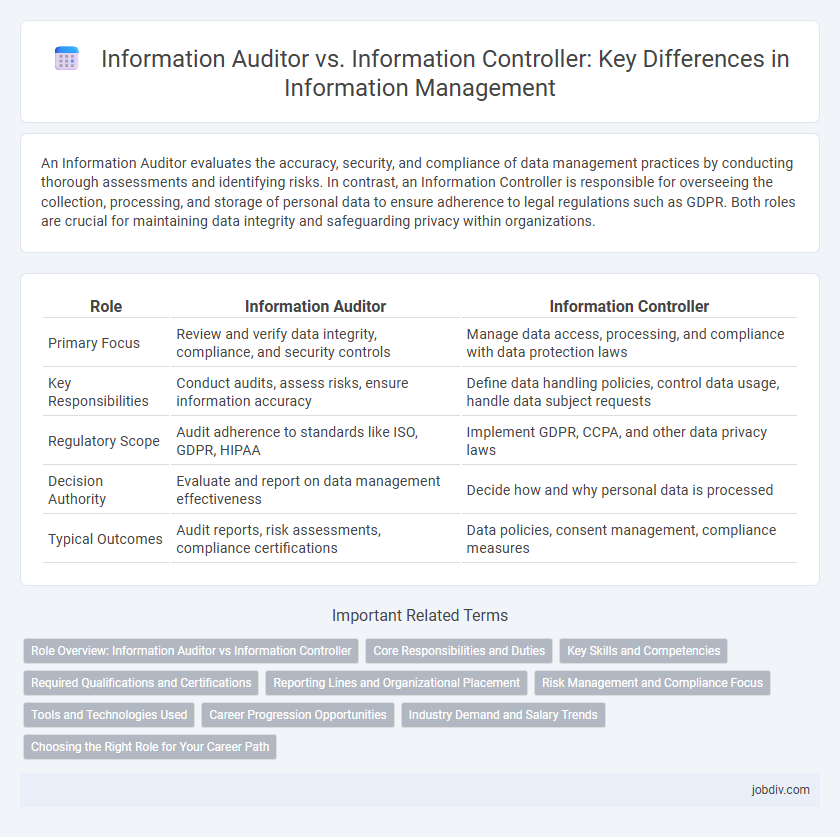An Information Auditor evaluates the accuracy, security, and compliance of data management practices by conducting thorough assessments and identifying risks. In contrast, an Information Controller is responsible for overseeing the collection, processing, and storage of personal data to ensure adherence to legal regulations such as GDPR. Both roles are crucial for maintaining data integrity and safeguarding privacy within organizations.
Table of Comparison
| Role | Information Auditor | Information Controller |
|---|---|---|
| Primary Focus | Review and verify data integrity, compliance, and security controls | Manage data access, processing, and compliance with data protection laws |
| Key Responsibilities | Conduct audits, assess risks, ensure information accuracy | Define data handling policies, control data usage, handle data subject requests |
| Regulatory Scope | Audit adherence to standards like ISO, GDPR, HIPAA | Implement GDPR, CCPA, and other data privacy laws |
| Decision Authority | Evaluate and report on data management effectiveness | Decide how and why personal data is processed |
| Typical Outcomes | Audit reports, risk assessments, compliance certifications | Data policies, consent management, compliance measures |
Role Overview: Information Auditor vs Information Controller
An Information Auditor evaluates the accuracy, security, and compliance of information systems by conducting systematic reviews and audits to identify vulnerabilities and ensure data integrity. In contrast, an Information Controller oversees the management, use, and distribution of data, establishing policies and controls to maintain regulatory compliance and protect sensitive information. Both roles collaborate to safeguard organizational data but focus respectively on assessment and governance functions.
Core Responsibilities and Duties
Information Auditors primarily focus on evaluating the accuracy, security, and compliance of data management systems through systematic audits and assessments. Information Controllers are responsible for overseeing data governance policies, ensuring lawful processing, and managing access rights to maintain data privacy and integrity. Both roles are critical in safeguarding organizational data but emphasize different aspects of information management and compliance.
Key Skills and Competencies
Information Auditors excel in risk assessment, compliance monitoring, and data integrity verification to ensure organizational adherence to regulatory standards. Information Controllers specialize in data governance, privacy management, and policy implementation, maintaining control over data access and lifecycle. Both roles require strong analytical abilities, attention to detail, and proficiency in data protection regulations like GDPR and ISO 27001.
Required Qualifications and Certifications
Information Auditors typically require certifications such as Certified Information Systems Auditor (CISA) and a strong background in IT auditing, risk management, and compliance frameworks. Information Controllers often need qualifications in data protection laws, such as Certified Information Privacy Professional (CIPP), along with expertise in GDPR and data governance. Both roles benefit from proficiency in cybersecurity principles, but Information Controllers prioritize legal and regulatory certifications while Information Auditors emphasize audit and control standards.
Reporting Lines and Organizational Placement
Information Auditors typically report to senior compliance officers or internal audit departments, ensuring independent oversight within an organization's governance structure. Information Controllers usually operate under data protection or legal teams, directly accountable to data privacy officers or chief information officers. The organizational placement of auditors emphasizes risk assessment and regulatory compliance, while controllers focus on data management and enforcement of privacy policies.
Risk Management and Compliance Focus
Information Auditors assess and verify the accuracy, security, and compliance of data management processes, identifying risks related to information integrity and regulatory adherence. Information Controllers are responsible for establishing data governance policies, overseeing data usage, and ensuring compliance with legal frameworks such as GDPR and HIPAA to mitigate risks. Both roles play critical roles in risk management by safeguarding information assets and ensuring organizational compliance with data protection regulations.
Tools and Technologies Used
Information Auditors utilize advanced data analytics software, audit management systems, and compliance monitoring tools to assess information accuracy and regulatory adherence. Information Controllers implement data governance platforms, access control technologies, and encryption tools to regulate data flow, ensure privacy, and maintain security protocols. Both roles leverage cybersecurity solutions and cloud-based storage but apply them differently according to their focus on auditing versus controlling information.
Career Progression Opportunities
Information auditors typically advance by deepening expertise in data compliance and risk assessment, moving toward senior audit roles or specialized consultancy positions. Information controllers progress through expanding responsibilities in data governance, privacy management, and regulatory adherence, often elevating to chief data officer or information governance manager roles. Both career paths offer leadership opportunities in shaping organizational data strategy and ensuring robust information security frameworks.
Industry Demand and Salary Trends
Information auditors are in high demand across financial services and healthcare sectors, with average salaries ranging from $70,000 to $110,000 annually due to their role in ensuring data compliance and security standards. Information controllers, who oversee data governance and strategic information management, command higher salaries typically between $90,000 and $130,000, reflecting their responsibility for optimizing data usage and regulatory adherence. Industry growth projections indicate a 12% increase in demand for information controllers by 2028, outpacing the 8% growth expected for information auditors.
Choosing the Right Role for Your Career Path
Choosing between an Information Auditor and an Information Controller depends on your career goals and skillset. Information Auditors specialize in evaluating data security, compliance, and risk management, often conducting thorough assessments to ensure organizational adherence to regulations. Information Controllers focus on managing data governance, overseeing data accuracy, privacy, and lifecycle, making critical decisions on data usage within an organization.
Information Auditor vs Information Controller Infographic

 jobdiv.com
jobdiv.com